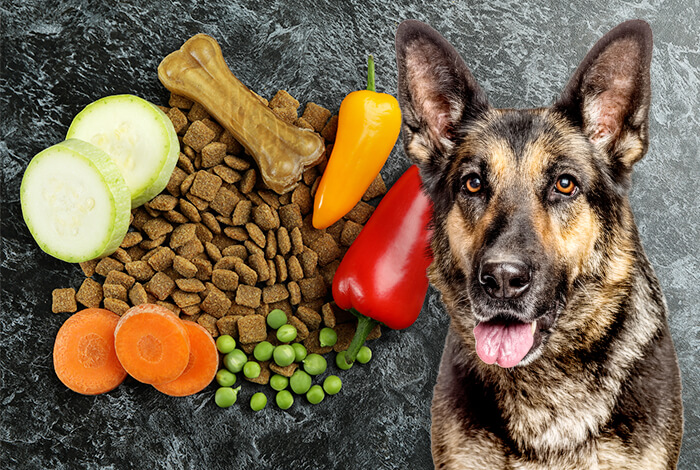![]() Reviewed By Joana Garrido DVM
Reviewed By Joana Garrido DVM
Most German Shepherds are very food-motivated dogs. Although they are not picky eaters, their pawrents should be meticulous in selecting the right pet food. As large-breed canines, these pooches have special requirements in their diet to ensure proper growth and development.
Our article serves as a useful guide in helping you find the best dog food for German Shepherds.
7 Tips to Find the Best Dog Food for German Shepherds
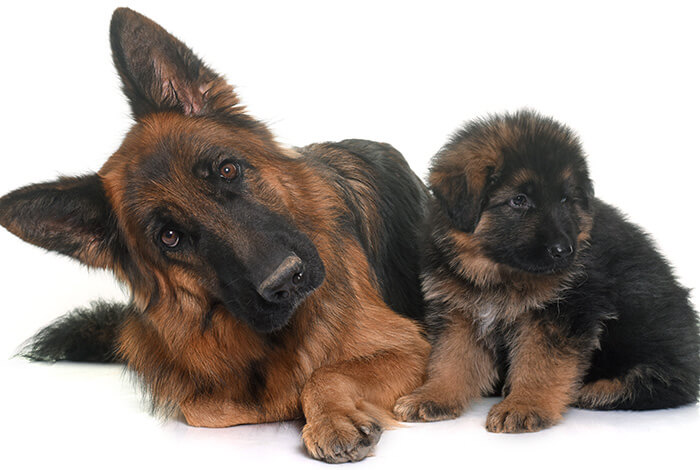
1. Mind the Nutritional Adequacy Statement.
Narrow down your choice of products by looking for a Nutritional Adequacy statement. It is a requirement by the Association of American Feed Control Officials (AAFCO) that clearly specifies if a German Shepherd dog food meets the nutritional standard set for a certain life stage.
Nutritional Adequacy statements are commonly located either on the side or back of the packaging. Look for any of the following:
- The product is formulated to meet the nutritional levels established by the AAFCO Dog (or Cat) Food Nutrient Profiles.
- Animal feeding tests using AAFCO procedures substantiate that the product provides complete and balanced nutrition.
- The product provides complete and balanced nutrition and is comparable in nutritional adequacy to a product that has been substantiated using AAFCO feeding tests.
Some products fail to meet AAFCO dog food nutrient profiles. Regulations require them to be labeled with “intermittent or supplemental feeding only.”
This means they should not be used as the main diet for German Shepherds and are not intended for long-term consumption.
Never purchase a German Shepherd dog food that does not contain a nutritional adequacy statement. Or else you run the risk of feeding your pet nutritionally deficient or imbalanced meals.
2. Go for Large-Breed Formulated Dog Food.
Large-breed dogs like German Shepherds have different nutritional requirements compared to small- to medium-size dogs.
For instance, their susceptibility to developing orthopedic diseases such as hip dysplasia calls for a reduced calcium intake and a well-balanced calcium-to-phosphorus ratio in their food during puppyhood.
According to experts, the recommended best dog food for German Shepherds when they are young should contain anywhere around but not over 0.8% to 1.2% dietary calcium on a dry matter basis.
Moreover, AAFCO suggests that the acceptable dietary calcium-to-phosphorus ratio for large-breed puppy food is anywhere between 1.1:1 and 2:1.
Large-breed-formulated dog food also contains supplements that combat musculoskeletal disorders. For instance, glucosamine and chondroitin help support bone and joint health.
With this in mind, when looking for the best dog food for German Shepherds, make sure the product’s nutritional statement contains the phrase: “including the growth of large-size dogs.”
3. Do Not Disregard the Protein Content.
As a highly active dog breed, the German Shepherd needs ample amounts of protein in his diet to fuel his body. Protein is also vital for different important body processes, including:
- Muscle repair and development
- Good skin and coat health
- Ensuring normal hormone production
- Maintaining a healthy immune system
The suitable amount of protein in dog food for German Shepherds will depend on their life stage. German Shepherd adults need at least 18% of protein. In comparison, German Shepherd puppies and lactating dams require a minimum of 22% protein in their meals.
4. Choose German Sheperd Dog Food With High-Quality Protein Sources.
Some pet food brands produce high-protein products, but if you look closer, they are mostly made up of processed ingredients and animal by-products.
Avoid dog food containing unspecified “meat,” “animal,” “poultry,” or “fish” ingredients. The lack of transparency could mean that these animal proteins were sourced unethically. They might come from sick, dead, and dying animals.
The best dog food for German Shepherds should explicitly state the whole meat protein used such as chicken, turkey, beef, salmon, or tuna.
In general, the ingredients in pet food are listed in decreasing order by weight. Ideally, the main ingredients listed on top of the ingredients list should be mostly whole meat proteins.
5. Carbohydrates Are Not the Enemy.
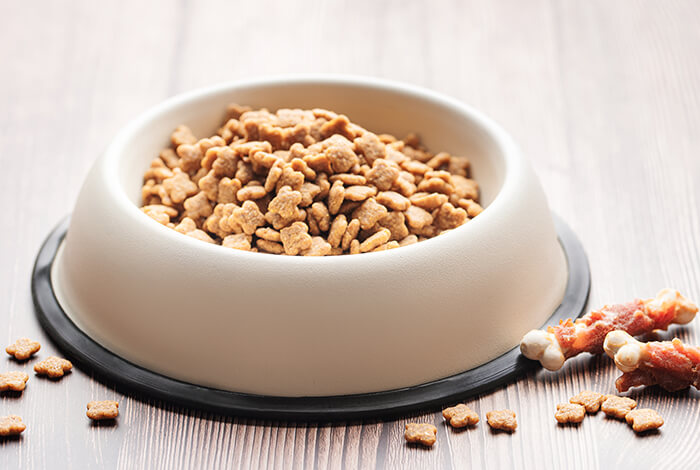
Carbohydrates often get a bad rap in the dog food world, but they are integral to the health of dogs. Much like proteins, carbs provide energy and fuel to the body.
Moreover, they are highly beneficial to the digestive systems of pooches. Carbohydrates help regulate bowel movements and improve digestion.
However, German Shepherd dog owners need to be picky with the carbohydrates making up their pets’ food. Look for complex carbohydrate ingredients since they are more digestible and offer a slow release of energy.
It keeps your canine companion from exhibiting sudden bursts of hyperactivity, which tends to happen after ingesting simple carbs. Some healthy complex carbohydrates to look for in the best dog food for German Shepherds are:
The diet of German Shepherds should consist of 14% to 30% carbohydrates. Puppies can benefit from 22% to 30% carbohydrates as they are extremely active.
Adults tend to have medium to high energy levels. So carbohydrate levels ranging between 14% and 22% are recommended for them. Elderly dogs will require a lower carb percentage, approximately around 12% to 18% since they have decreased activity levels.
6. Look for Healthy Fat-Rich Dog Food Ingredients.
Fats do more than just give energy to German Shepherds. They are crucial for body insulation, hormone regulation, inflammation control, and maintaining healthy skin and coat. Moreover, they promote better absorption of fat-soluble nutrients like vitamins A, D, E, and K.
However, the best dog food for German Shepherds should not contain just any fats. They must come from natural and healthy sources such as salmon oil, flaxseed oil, chicken fat, and purified algal oil.
Check the fat content of the product. Adult German Shepherds need a minimum of 5% fat in their diet while growing puppies and pregnant dams require at least 8%.
7. Avoid Synthetic Preservative and Additive-Heavy Dog Food.
The amount of synthetic ingredients present in pet food is a telling indicator of its quality. Avoid products largely consisting of artificial preservatives, flavorings, and other additives.
They can trigger food allergies and digestive issues in German Shepherds with sensitive stomachs. Some of the most common synthetic ingredients are also linked to other health problems. For instance:
- Butylated hydroxyanisole (BHA) is found to be carcinogenic and may encourage the development of cancerous tumors.
- Butylated hydroxytoluene (BHT) poses the same threat as BHA.
- Ethoxyquin can potentially induce liver issues if ingested in large amounts.
- Propylene glycol may cause central nervous system depression, renal damage, and lactic acidosis in large doses.
Natural preservatives such as rosemary extract, vitamin C, and vitamin E are safer alternatives. But keep in mind their potency of preventing spoilage is lower.
Thus, proper storage of your German Shepherd’s food is important. Avoid buying in bulk too since it takes longer for your pet to finish the whole pack, which further increases the chances of spoilage.
Ideal Diets for German Shepherds with Exocrine Pancreatic Insufficiency (EPI)
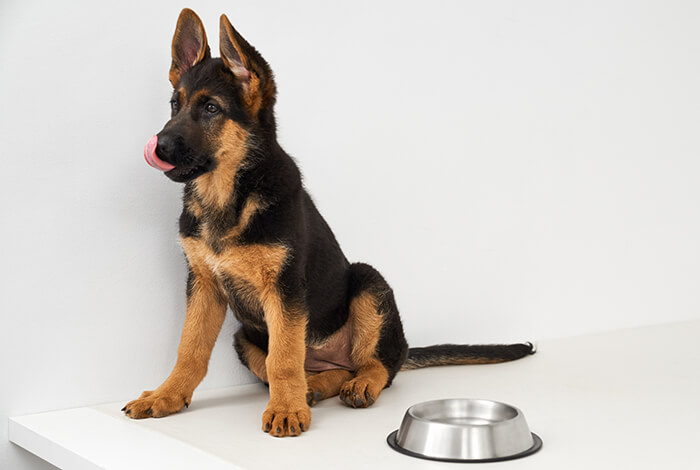
EPI is an incurable hereditary degenerative disease in the German Shepherd dog breed. It causes poor pancreatic function, which reduces enzyme production in the pancreas.
Pancreatic enzymes are responsible for breaking down fats, carbohydrates, and proteins from ingested food for proper digestion and nutrient absorption.
German Shepherds with EPI are at risk of health complications like secondary gut damage. Diet and supplementation play a big role in the management of this breed-specific condition.
Here are some of the common food-related adjustments suggested by the vet:
- Most dogs with EPI respond well to highly digestible moderate-fat, low-fiber diets. Avoid low-fat and high-fiber pet foods since they do not help resolve anorexia, which is a common symptom of EPI, and also hinder pancreatic enzyme activity.
- Due to insufficient amounts of natural pancreatic enzymes in pets with EPI, pancreatic enzyme supplementation is often initiated. It helps in breaking down food particles in the stomach. We recommend moistening the pancreatic enzyme powder with food before intake to prevent oral bleeding.
- Fresh pancreas sourced from a reputable butcher or raw pet food suppliers can be an alternative to pancreatic enzyme supplements. 1 to 3 ounces of raw chopped pancreas is equivalent to 1 teaspoon of the supplement.
The effectiveness of these EPI management strategies may vary from dog to dog. So always keep the vet up to date about your German Shepherd’s response to these dietary changes and supplementation.
Recommended Caloric Intake of German Shepherds
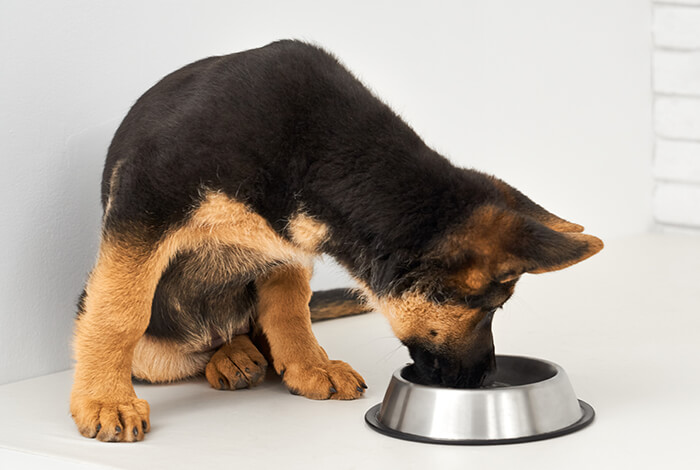
The German Shepherds are working dogs with high levels of energy. They need sufficient amounts of calories in their daily meals to keep them active throughout the day.
The daily calorie requirements of these dogs are as follows:
- Puppies below 4 months old: 590 to 1700 calories
- Puppies over 4 months old: 1220 to 1900 calories
- Inactive German Shepherds: 1,270 to 1,540 calories
- Active German Shepherds: 1,740 to 2,100 calories
- Active German Shepherds: 1,280 to 1,540 calories
The caloric needs of German Shepherds are not set in stone. It may increase or decrease depending on various factors such as age, changes in energy levels, and the development of illnesses. Make adjustments according to the vet’s guidance.
Feeding Frequency for German Shepherds
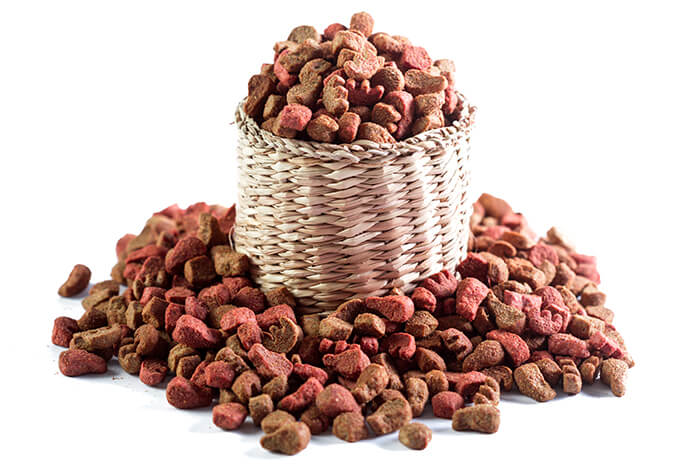
Feeding-related health issues like obesity and bloat affect the German Shepherd dog breed. Splitting their meals into smaller portions and spreading them throughout the day helps reduce the chances of these ailments from occurring.
Generally, German Shepherd puppies ages 8 weeks to 6 months should be fed 4 times a day. Juvenile to adolescent puppies can have 3 meals daily. Once German Shepherds reach adulthood, twice a day of feeding will do.
FAQs About Searching for the Best Dog Food for German Shepherds
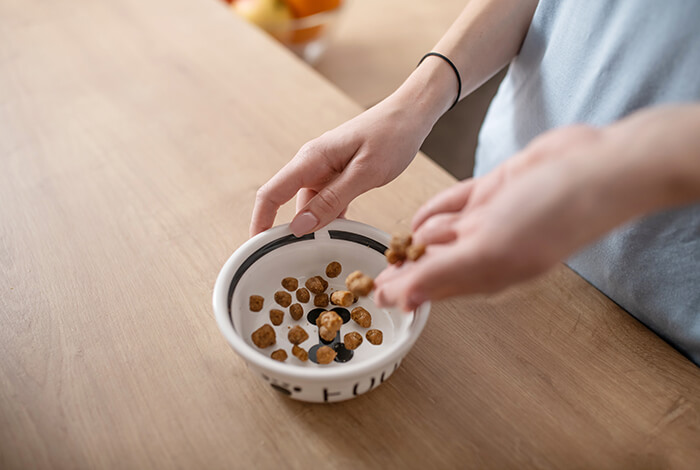
1. Do German Shepherds Need Special Dog Food?
Since German Shepherds are large dogs, they need dog food specially formulated for their breed size.
Large canines are predisposed to orthopedic disorders at an early age due to the rapid growth rate. They should be fed meals containing less calcium and a different calcium-to-phosphorus ratio to slow down their bone and joint development.
2. When Can I Safely Switch My German Shepherd Puppy to Adult Food?
You can safely switch your German Shepherd puppy to adult dog food once he has reached adulthood, which happens around 12 to 18 months of age.
Keep in mind that timing greatly matters. Transitioning too early can lead to nutritional imbalances and bone growth issues. Switching too late may lead to obesity and increased bone development, which facilitate orthopedic problems.
3. Can German Shepherds Eat Home Food?
German Shepherds can eat home food provided that it is specifically formulated for them. Strictly, no feeding of leftovers because it can cause diet-related problems like food poisoning, obesity, and finicky eating.
Nutritional inadequacies are a prevalent problem in homecooked dog food. So do not just rely on random recipes you find online. Seek the professional advice of a certified veterinary nutritionist to create complete and balanced German Shepherd dog food at home.
4. How Often Do You Feed a German Shepherd?
During early puppyhood, feed your German Shepherd 4 times a day. Then reduce it to 3 feedings once he becomes a juvenile to adolescent puppy. When he turns into a full-grown canine, offer him food twice daily.
Summary
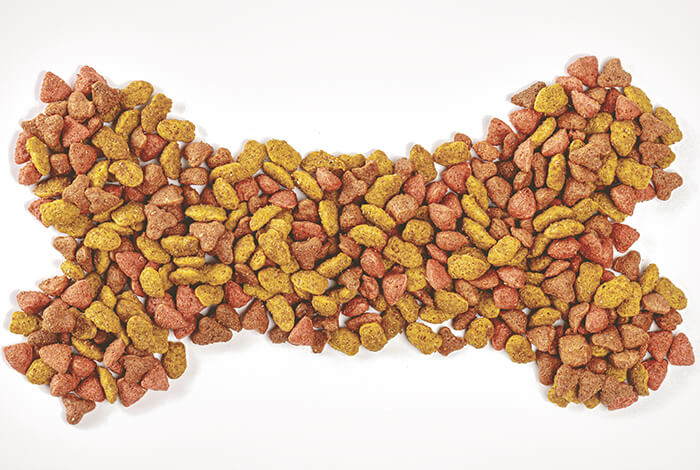
German Shepherds are large working dogs predisposed to breed-specific ailments like orthopedic diseases. These health issues should be taken into consideration when choosing the best dog food for them and when tailoring their diet.
Providing them with the right choice of pet food significantly helps in lowering the chances of these ailments developing at an early age. Visit our Diet and Recipes page to find more feeding and nutritional guides for other dog breeds.

